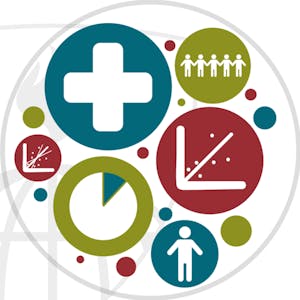This specialization in Biostatistics in Public Health is designed for public health and healthcare professionals, researchers, data analysts, and social workers. It provides a concepts-centric primer on biostatistics, equipping learners with essential statistical skills for interpreting and analyzing data in public health, medicine, biological science, and related fields. Upon completion, participants will have the ability to read and respond to the scientific literature, including the Methods and Results sections, as well as engage as part of a research team.
The course covers a range of key topics, including:
Offered by Johns Hopkins University, this course enables learners to develop the necessary statistical skills to contribute effectively to research and evidence-based decision-making in public health and related fields.
Certificate Available ✔
Get Started / More Info
This course covers essential modules in biostatistics, including Summary Statistics in Public Health, Hypothesis Testing, Simple Regression Analysis, and Multiple Regression Analysis. Gain the skills to calculate, interpret, and analyze statistical data for effective research participation.
This module focuses on calculating summary statistics from public health and biomedical data. Participants will learn to interpret data visualizations and analyze different data types, including continuous, binary, and time-to-event data.
Explore hypothesis testing methods in public health, including the use of statistical methods to analyze sampling distribution, estimation and interpretation of confidence intervals for single and two populations, and interpretation of p values for hypothesis testing.
This module covers the practice of simple regression methods to determine relationships between an outcome and a predictor. Participants will also learn to recognize confounding in statistical analysis and perform estimate adjustments.
Participants will practice multiple regression methods in this module to determine relationships between an outcome and multiple predictors. The Spline approach for non-linear relationships with continuous predictors and calculations with multiple predictor variables will also be covered.
Explore the social, economic, and political factors contributing to health disparities and learn innovative strategies to achieve health equity.
Epidemics is an in-depth course that delves into the origins, spread, and control of infectious disease epidemics, as well as the importance of effective communication...
This course provides a solid foundation in statistical analysis and data interpretation within the context of public health. Students will learn to use R for analysis...
This course delves into the social determinants of health, exploring ways to address health disparities and achieve equity at various levels of influence.